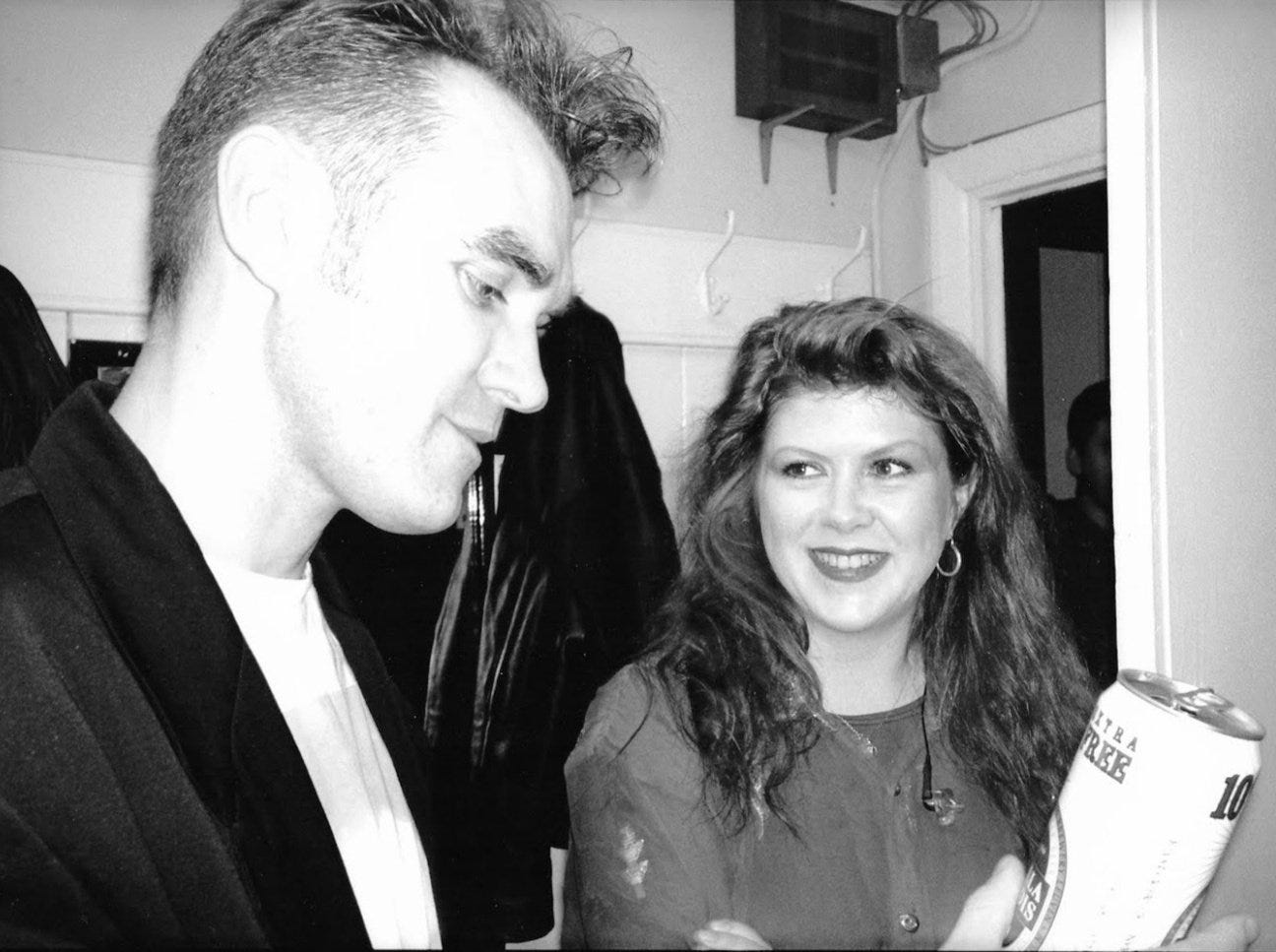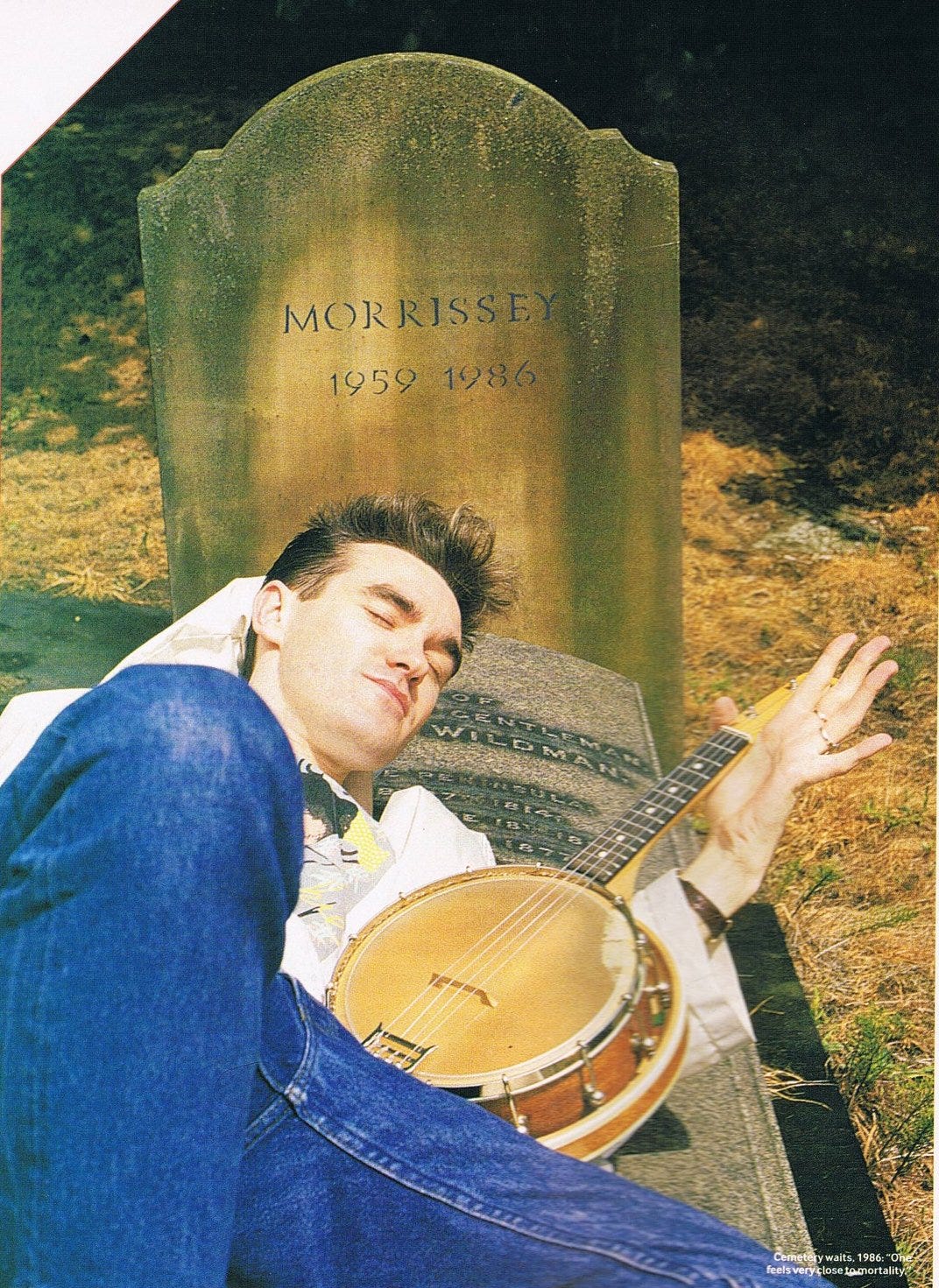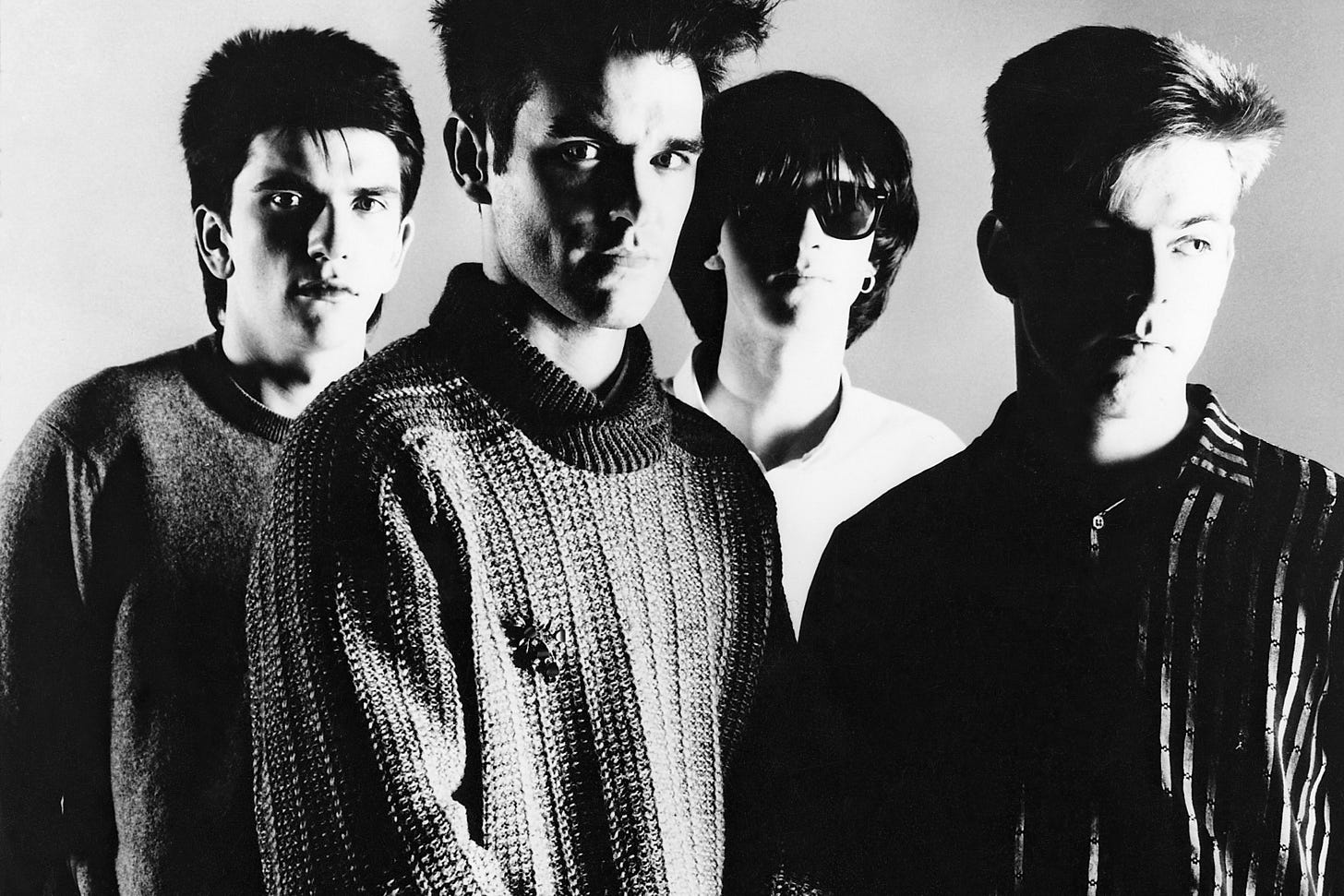The Double-Edged Sword of “Bigmouth Strikes Again” By The Smiths
This is the story of "Bigmouth Strikes Again," a song full of humor, self-deprecation, and the self-immolation Morrissey continues to commit nearly 40 years later.
How are Morrissey’s ego, the Ancoats district in Manchester, and The Rolling Stones connected? You’re about to find out.
“We’re still at a stage,” stated Morrissey in an NME interview, “where if I rescued a kitten from drowning they’d say ‘Morrissey Mauls Kitten’s Body.’ So what can you do?”
Morrissey has always had a clever turn of phrase, a sharp whit, and one of THE MOST self-sacrificing personas in music. He just rubs people the wrong way, says things that are completely at odds with his core audience, and tends to be the harbinger of his own doom and gloom.
Hi, I’m Andy Fenstermaker, host of Poetic Wax, a weekly music history series — on YouTube, podcast platforms, and Substack — where I dig into the record collection I’ve been building since the 1990s and explore the sometimes little known history of a band, album, or song from within.
Today I’m pulling out my original 1986 US Sire pressing of The Queen is Dead, my 1986 original cassette of The Queen is Dead, and my extensive 2017 five-LP box set of … you guessed it … The Queen is Dead.
Which brings us to — no surprise — The Smiths’ 1986 song “Bigmouth Strikes Again,” which opens the B-side of the album whose name I’ve now repetitively said ad nauseam.
Before diving into the story, consider subscribing. It’s free, and it helps support the effort I put into creating these pieces.
“Bigmouth Strikes Again” by The Smiths is one of those songs that lingers. It’s brash, it’s witty, and it’s a little bit tragic. Written at the peak of The Smiths' career, the song captures Morrissey’s complex relationship with fame, criticism, and his own role as an outsider.
But to fully understand why “Bigmouth” resonates, we need to dive deeper into its history, the biting humor behind it, and the very real frustration it expresses.
The Origins of Bigmouth Strikes Again
By 1986, The Smiths were already a cornerstone of the British indie scene. Their third album, The Queen Is Dead, was a bold statement. It was an album that balanced light and dark with Johnny Marr’s jangly, intricate guitar work providing the perfect backdrop to Morrissey’s sharp, sometimes melancholic lyricism.
One of the standout tracks from that album? “Bigmouth Strikes Again.”
Written by Johnny Marr and Morrissey, the song was fast, direct, and built on a driving, repetitive guitar riff. Marr would note that he was striving to create his own take on “Jumpin’ Jack Flash” by The Rolling Stones with that riff. Here’s a quote from Marr:
“I wanted something that was a rush all the way through… I thought the guitar breaks should be percussive, not too pretty or chordal.”
While the music was upbeat, the lyrics told a different story—a tale of someone whose words have gotten them into trouble once again.
And if there’s one person who knew about that, it was Morrissey.
That high pitched voice in the song was originally supposed to be Kristy MacColl but after she recorded the bit, the band found the harmonies weird and ditched them. They’d bring her back to sing on “Ask” which would drop as a single in 1986. Instead, Morrissey filtered his own vocals through a harmonizer, giving it a ‘chipmonk’ like sound.
In the liner notes, these vocals would be credited to an Ann Coats — a pun on the Ancoats district in Manchester.
This was the third and final of a triptych of highly personal and critical tracks by Morrissey on the album. It began with “The Boy with a Thorn in His Side,” a hopeless lamentation of the criticism the media has towards Morrissey himself. Next is “Rubber Ring” which, according to Songs That Saved Your Life: The Art of the Smiths 1982-87 by Simon Goddard, “addressed his audience, questioning their loyalty and the validity of his work.”
And finally, “Bigmouth Strikes Again,” in which Morrissey paints himself a martyr.
Morrissey’s Relationship with Controversy
Morrissey was never one to hold back. By the time “Bigmouth” was released, he’d already developed a reputation for his controversial public statements. He could be critical of just about everything—government, celebrity culture, even his own fans. But the media often latched onto these comments, sometimes blowing them out of proportion.
The media? REALLY? Naw…
This public perception—the idea that Morrissey couldn’t keep his mouth shut—was the spark for “Bigmouth Strikes Again.”
In an interview with NME, Morrissey explained that the song was about how his words often backfired. He said:
“I often feel like a lightning rod for so much criticism and abuse, and that song was a way of expressing how ridiculous the whole thing felt." — Morrissey, NME 1986]
In essence, Morrissey felt misunderstood. He’d say something tongue-in-cheek, and it would get spun into controversy. It’s all there in the lyrics:
Sweetness, I was only joking when I said I’d like to smash every tooth in your head.
It’s a sharp and violent line, but followed immediately by the disclaimer that it was “only joking.” This captures Morrissey’s frustration with how his words were taken—his biting humor often perceived as cruelty.
Humor and Irony in Bigmouth Strikes Again
While the song expresses frustration, “Bigmouth Strikes Again” is also deeply funny—full of Morrissey’s trademark self-deprecation and irony.
Take this line:
"Now I know how Joan of Arc felt, as the flames rose to her Roman nose and her Walkman started to melt."
Here, Morrissey compares himself to Joan of Arc, the historical figure who was burned at the stake for her beliefs. But then he throws in this absurd image of her Walkman melting. The historical drama is immediately undercut by modern absurdity—a Walkman, of all things.
Remember, it was the 1980s. That’s what people listened to music on back then.
It’s Morrissey at his best: blending tragedy with humor, mythic imagery with the mundane. He’s poking fun at his own sense of martyrdom, exaggerating his plight while acknowledging the absurdity of it all.
This duality—the mix of grandiose suffering and ironic detachment—is what gives the song its edge. Morrissey is both self-pitying and self-mocking, playing up the idea of himself as a misunderstood figure persecuted for his honesty.
Alienation and Outsidership
At its heart, “Bigmouth Strikes Again” is also a song about alienation. Morrissey’s lyrics resonate with anyone who has ever felt like an outsider—misunderstood, isolated, or rejected by society.
The line: And I've got no right to take my place in the human race captures this perfectly. It’s a feeling of not fitting in, of being ostracized, and it’s something that many Smiths fans connect with on a deep, personal level. Morrissey has always sung for the misfits, the ones who felt out of place, and Bigmouth most certainly continues that tradition.
But what sets this song apart is that Morrissey doesn’t just wallow in self-pity. He uses humor and wit to process that alienation, making it both personal and universal.
He chastises the media while slapping himself with an over dramatized woe is me. But at the same time he kinda pokes fun at himself. I mean, who else could be the bigmouth but Morrissey himself?
He just can’t help it.
The Lasting Legacy of Bigmouth Strikes Again
Since its release in 1986, “Bigmouth Strikes Again” has become one of The Smiths' most enduring tracks. While it never reached the top of the charts, it remains a fan favorite and a personal favorite.
But perhaps its most lasting legacy is its influence on alternative music. The song’s mix of biting lyrics, jangly guitars, and self-aware humor has left a deep mark on indie rock. Bands from The Strokes to Arctic Monkeys have taken cues from The Smiths' ability to blend personal frustration with clever, sardonic storytelling.
Ultimately, “Bigmouth Strikes Again” is a reminder of The Smiths’ unique place in music history. It’s a song that’s as much about alienation as it is about embracing your flaws, about speaking your mind—even if it gets you into trouble.
And that’s why, decades later, Morrissey’s big mouth continues to strike a chord.
Example: dig into his aptly grandiose autobiography—simply titled Autobiography, to literally no one’s surprise and to literally everyone’s over-dramatized eyeroll— and you get Morrissey’s “can’t help myself” Bigmouth persona through and through.
Let me know in the comments—what’s your favorite song by The Smiths. Maybe I’ll dig into that one the next time I cover the band.







